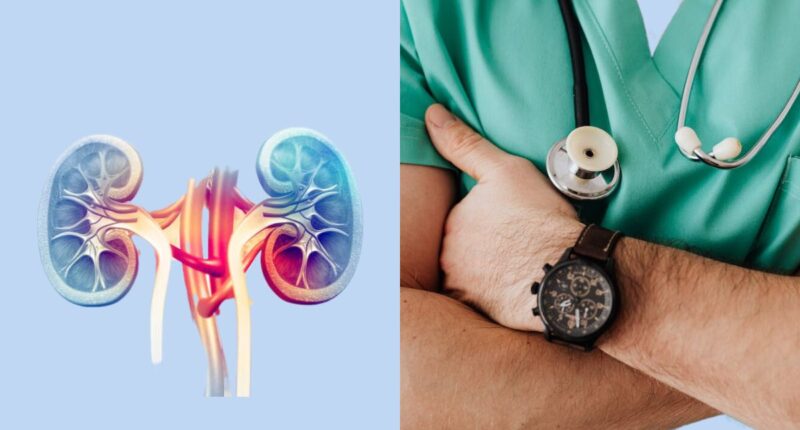11 Most Common Diseases That Damage Your Kidney – The kidneys are vital organs responsible for maintaining the body’s internal environment. When they become diseased, their ability to function optimally is compromised, leading to various health complications. Let’s delve into the 12 most common diseases that can cause kidney damage.
1. Chronic Kidney Disease (CKD)
Chronic Kidney Disease, or CKD, is a long-term condition where the kidneys gradually lose their ability to function adequately. It can be caused by conditions like diabetes, high blood pressure, and certain inherited disorders. CKD progresses in stages, with the final stage requiring dialysis or kidney transplantation.
2. Kidney Stones
Kidney stones are solid deposits that form in the kidneys when certain substances in the urine become highly concentrated. These stones can be incredibly painful when they pass through the urinary tract. In severe cases, kidney stones can obstruct the flow of urine and cause damage to the kidneys. Here’s a natural method to cleanse your kidney
3. Urinary Tract Infections (UTIs)
Urinary Tract Infections occur when bacteria enter the urinary system and multiply, leading to an infection. If left untreated, UTIs can spread to the kidneys, causing a condition called pyelonephritis. This infection can result in kidney damage if not promptly addressed.
4. Glomerulonephritis
Glomerulonephritis is a condition where the tiny filtering units of the kidneys, called glomeruli, become inflamed and damaged. It can occur as a result of infections, autoimmune diseases, or certain medications. Glomerulonephritis can lead to kidney dysfunction and, if left untreated, progress to chronic kidney disease.
5. Polycystic Kidney Disease (PKD)
Polycystic Kidney Disease is an inherited disorder characterized by the growth of multiple cysts in the kidneys. These cysts gradually enlarge over time, interfering with kidney function. PKD can lead to kidney failure if not managed appropriately.
6. Diabetes
Diabetes is a chronic condition that affects the body’s ability to regulate blood sugar levels. Over time, high blood sugar levels can damage the blood vessels in the kidneys, impairing their function. Diabetic nephropathy is a common complication of diabetes that can lead to kidney failure.
7. High Blood Pressure (Hypertension)
High Blood Pressure, or hypertension, is a condition characterized by elevated blood pressure levels. Prolonged high blood pressure can damage the blood vessels in the kidneys, reducing their functioning and impairing their ability to filter waste products effectively. Hypertension is one of the leading causes of chronic kidney disease. Read more High Blood Pressure Diet And food: 7 Foods That Can Lead To Hypertension
8. Lupus Nephritis
Lupus Nephritis is a kidney disorder that occurs as a complication of systemic lupus erythematosus (SLE), an autoimmune disease. In lupus nephritis, the immune system mistakenly attacks the kidneys, leading to inflammation and damage. If left untreated, it can result in kidney failure.
9. Pyelonephritis
Pyelonephritis is a severe type of urinary tract infection that affects the kidneys. It occurs when bacteria from the bladder travel up the ureters and infect the kidneys. If not promptly treated, pyelonephritis can cause kidney damage and even life-threatening complications.
10. Renal Artery Stenosis
Renal Artery Stenosis refers to the narrowing of the arteries that supply blood to the kidneys. This condition often occurs due to atherosclerosis, where plaque buildup restricts blood flow. Reduced blood flow to the kidneys can lead to hypertension and kidney damage.
11. Interstitial Nephritis
Interstitial Nephritis is an inflammation of the kidney’s interstitial tissue, which surrounds the tubules responsible for filtering waste products. It can be caused by certain medications, infections, or autoimmune diseases. If left untreated, interstitial nephritis can lead to chronic kidney disease.
RELATED: 11 Healthy Fruits That Help Revitalize Kidneys

How to Prevent Diseases That Damage Your Kidney
Preventing diseases that can damage your kidneys is crucial for maintaining optimal kidney health. By adopting a few lifestyle changes and taking proactive measures, you can reduce the risk of developing kidney-related conditions. Here are some steps you can take to prevent diseases that damage your kidneys:
Stay Hydrated: Adequate hydration is essential for kidney function. Drink plenty of water throughout the day to help flush out toxins and maintain proper kidney function. Aim to consume at least 8 cups (64 ounces) of water daily, or more if you engage in intense physical activity or live in a hot climate.
Maintain a Healthy Diet: A balanced and nutritious diet plays a vital role in kidney health. Include a variety of fruits, vegetables, whole grains, lean proteins, and healthy fats in your meals. Limit your intake of processed foods, saturated fats, and added sugars. Reduce your salt (sodium) intake as excessive sodium can increase blood pressure and strain the kidneys.
Manage Blood Pressure and Diabetes: High blood pressure and diabetes are leading causes of kidney damage. Monitor your blood pressure regularly and keep it within a healthy range. If you have diabetes, control your blood sugar levels through medication, diet, exercise, and regular check-ups.
Exercise Regularly: Engaging in regular physical activity helps maintain overall health, including kidney health. Aim for at least 150 minutes of moderate-intensity aerobic exercise or 75 minutes of vigorous-intensity exercise each week. Consult with your healthcare provider before starting any new exercise regimen.
Avoid Tobacco and Limit Alcohol Consumption: Smoking can damage blood vessels and worsen kidney function. Quitting smoking is one of the best things you can do for your overall health, including your kidneys. Additionally, limit alcohol consumption as excessive alcohol intake can contribute to kidney damage.
Practice Good Hygiene: Preventing urinary tract infections (UTIs) can help protect your kidneys. Practice good hygiene by wiping from front to back after using the toilet, urinating before and after sexual activity, and staying clean and dry in the genital area.
Avoid Overuse of Medications: Certain medications, such as non-steroidal anti-inflammatory drugs (NSAIDs), can cause kidney damage if used excessively or for prolonged periods. Follow the recommended dosage guidelines and consult with your healthcare provider if you have any concerns about medications’ potential effects on your kidneys.
Get Regular Check-ups: Regular medical check-ups allow healthcare professionals to monitor your kidney function and identify any potential issues early on. Routine tests, such as blood pressure measurement, urine analysis, and blood tests, can help detect kidney problems at an early stage.
Maintain a Healthy Weight: Obesity and overweight can increase the risk of developing kidney-related conditions. Aim to achieve and maintain a healthy weight through a combination of a balanced diet and regular exercise.
Manage Stress: Chronic stress can contribute to high blood pressure and other health problems that may impact kidney function. Find healthy ways to manage stress, such as practicing relaxation techniques, engaging in hobbies, or seeking support from loved ones or a mental health professional.
By following these preventive measures, you can significantly reduce the risk of developing diseases that damage your kidneys. Remember, prevention is key when it comes to maintaining optimal kidney health. Take care of your kidneys, and they will take care of you.
FAQs
A: In some cases, early intervention and proper treatment can slow down or halt the progression of kidney damage. However, complete reversal of kidney damage may not always be possible.
A: Symptoms of kidney damage can include fatigue, swelling, changes in urine output, blood in urine, and persistent high blood pressure. However, some kidney diseases may not present noticeable symptoms in the early stages.
A: Some kidney diseases, such as polycystic kidney disease, have a genetic component and can be inherited. However, not all kidney diseases are hereditary.
A: To protect your kidneys, maintain a healthy lifestyle, including a balanced diet, regular exercise, staying hydrated, avoiding excessive alcohol consumption, and managing underlying health conditions like diabetes and high blood pressure.
A: If you experience persistent symptoms such as changes in urine, unexplained fatigue, or swelling, it is advisable to consult a healthcare professional who can evaluate your symptoms and perform appropriate tests to assess kidney function.









